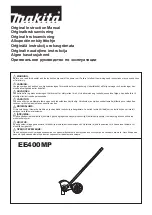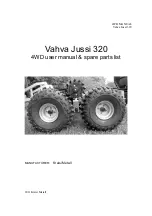
20
────────────────────────────────────────────────────
3.1 Notes on Use
────────────────────────────────────────────────────
WARNING
In order to prevent electric shock and short-circuit accidents, shut
off the power to the line to be measured before connecting the
direct connection voltage and current cables to the terminals.
Be sure to connect the voltage input terminals, current input terminals
correctly. Measurement which is attempted with the wiring connected
incorrectly may cause damage to the unit or a short-circuit.
To avoid electrical accidents and to maintain the safety
specifications of this instrument, connect the power cord provided
only to a 3-contact (two-con ground) outlet.
When using an external voltage transformer, do not leave the
secondary side short-circuited. If a voltage is applied to the primary
while the secondary is short-circuited, a high current will flow
through the secondary, which could lead to fire or malfunction.
When using an external current transformer, do not leave the
secondary side open-circuit. If a current flows through the primary
while the secondary is open-circuit, this can generate a high voltage
on the secondary, which is extremely dangerous.
CAUTION
・ To avoid electrical accidents, use wiring with more than adequate
current carrying capacity and voltage insulation properties.
・ When the power is turned off, do not apply voltage or current to the
voltage input terminal, current input terminal, or clamp sensor. Doing
so may damage the unit.
NOTE
・
For 3P3W, 3V3A measurement, the active power values for each channel are
found from the voltages between lines and the currents on each line, and
have no individual significance.
・
If the maximum values of the voltage or current on the lines being measured
exceed the measurement range of this unit, use an external voltage transformer
(PT) or current transformer (CT). In this case, by setting the corresponding PT
and CT ratios with the scaling function of this unit, you can directly read off
the measured values. See Section 4.5, "Setting the Scaling."
・
For combinations 1P3W and above, there are restrictions on the
combinations of input units. See Section 4.1, "Setting the Wiring Mode."
・
When using an external voltage transformer (PT) or current transformer
(CT), its precision, phase accuracy, frequency characteristics, and so on, may
greatly affect the error in the measured power value. Use transformers with
adequate frequency characteristics and small phase error for the frequency
band of the line being measured.
・
When using a voltage transformer (PT) or current transformer (CT), ground
one side of the secondary for safety.
Summary of Contents for Power HiTester 3193
Page 2: ......
Page 50: ...32 3 9 Operations During Power Failure ...
Page 76: ...58 4 13 Degaussing ...
Page 80: ...62 5 2 Setting the Frequency Range fa ...
Page 108: ...90 9 3 Internal Circuit for the External Control and Timing ...
Page 112: ...94 10 3 Output Rate ...
Page 250: ...232 13 9 Error and Overflow Displays ...
Page 278: ...260 17 5 Internal Block Diagram ...
Page 284: ...266 19 2 Installation Procedures For JIS standard For EIA standard External Dimensions ...
Page 300: ...282 20 4 Internal Block Diagram of the 3193 ...
Page 306: ...INDEX 4 Index ...
Page 307: ......
Page 308: ......
Page 309: ......
Page 310: ......
















































